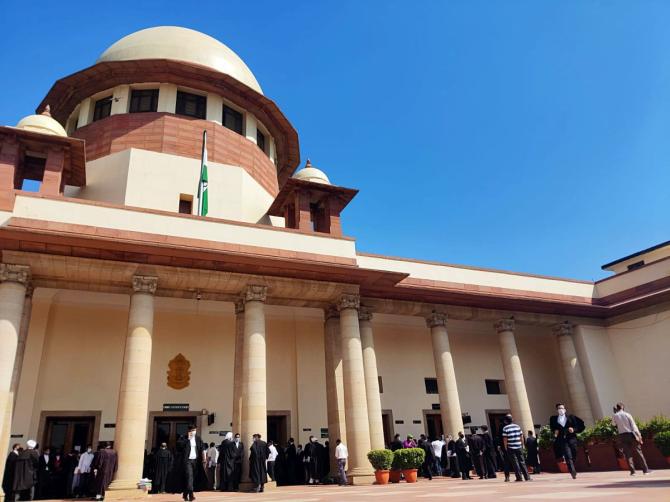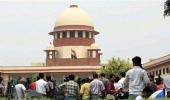In an unprecedented development, the Supreme Court Collegium has made public the names of the two judges on the panel who objected to the method of 'circulation' adopted for eliciting the views of its members on the appointment of judges to the apex court.

In a statement dated October 9, which became public on Monday, the Collegium said Justices D Y Chandrachud and S Abdul Nazeer had objected to the method of 'circulation' that was used for the first time for eliciting the views of its members who were unable to attend the proceedings physically.
The collegium said its September 30 meeting, which became controversial as the proposal initiated by Chief Justice of India U U Lalit received concurrence from two of the judges on the panel, while the other two objected to the process, stands 'discharged'.
The Collegium, which is headed by the CJI and comprises Justices D Y Chandrachud, Sanjay Kishan Kaul, S Abdul Nazeer and K M Joseph, gave the entire sequence of events starting with its first meeting dated September 26, when the names of 11 judges were considered, till September 30, 2022, the day the whole controversy erupted.
The statement said informal deliberations with regard to the proposed appointments had been going on for some time and a formal meeting took place on September 26, 2022, when the names of 11 Judges were considered.
'As there was unanimity of opinion on the name of Justice Dipankar Dutta, Chief Justice, high court of Bombay, a Resolution to that effect was passed and the consideration of the names of other ten Judges was deferred till September 30, 2022,' it said.
Though the procedure of circulating the judgments of the prospective candidates for making an objective assessment of their relative merit was introduced for the first time in the meeting held on September 26, 2022 and the name of Justice Dutta was cleared, a demand was raised by some of the members that 'we should have more judgments of the other candidates. Therefore, the meeting was postponed to September 30, 2022 and more judgments were circulated'.
'In continuation of the deliberations that took place on September 26, 2022, the postponed meeting of the collegium was convened on September 30, 2022 at 4.30 pm. However, since one of the members (Dr Justice D Y Chandrachud) did not attend the meeting, the CJI sent a proposal vide letter dated September 30, 2022 by way of circulation,' the statement said.
The statement said CJI's proposal received the approval of Justices Sanjay Kishan Kaul and K M Joseph vide their respective letters dated October 1 and October 7, 2022.
'By separate letters dated October 1, 2022, Justice D Y Chandrachud and Justice S Abdul Nazeer, objected inter alia to the method adopted in the letter dated September 30, 2022,' it noted.
The letters of Justices Chandrachud and S Abdul Nazeer, however, 'did not disclose any views against any of these candidates'.
'This was brought to their Lordships' notice and reasons were solicited and/or alternative suggestions were invited vide second communication dated October 2, 2022 addressed by the CJI. There was no response to said communication,' the statement said.
The meetings of the Collegium are usually held physically and, in case of differences over the names of candidates, the panel irons them out before a consensus list is formally announced.
The names of the candidates and their judgments are also usually not circulated to the members of the Collegium in physical absence, sources with intimate knowledge of the subject said.
'Thus, the proposal initiated by the CJI had concurrence from Justice Sanjay Kishan Kaul and Justice K M Joseph. Dr Justice D Y Chandrachud and Justice S Abdul Nazeer had objected to the process of selection and appointing judges by circulation,' the statement said.
It added the matter was, therefore, ideally suited to have a discussion across the table amongst the judges forming the Collegium.
The statement said while the process that started with the Collegium's meeting of September 26 was on, a letter dated October 7, 2022 was received from the Union Law Minister requesting the CJI to nominate his successor.
'In the circumstances, no further steps need be taken and the unfinished work in the meeting called for September 30, 2022 is closed without there being any further deliberation. The meeting dated September 30, 2022 stands discharged,' the 5-member Collegium said in the statement.
CJI Lalit is due to retire on November 8 and Justice Chandrachud, the senior-most judge after him, is widely tipped to be the next Chief Justice of India in accordance with the tradition.
The top court currently has 29 judges, including three women judges, against the sanctioned strength of 34.











 © 2025
© 2025